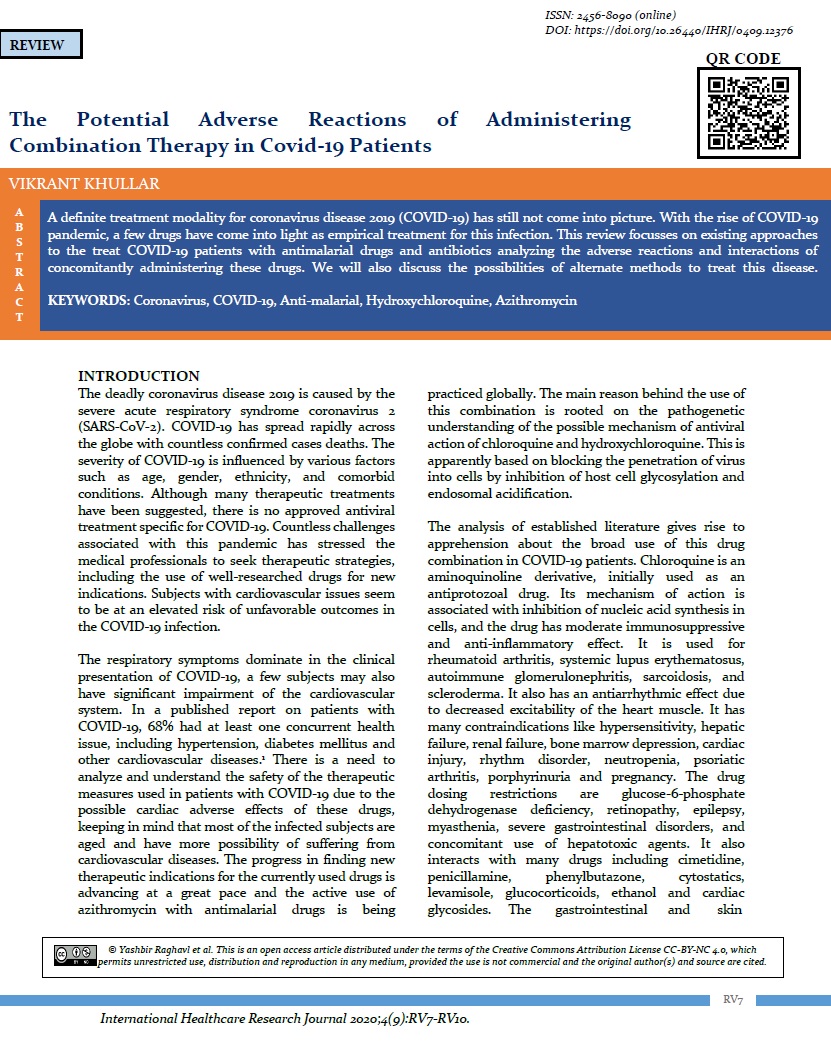The Potential Adverse Reactions of Administering Combination Therapy in Covid-19 Patients
Abstract
A definite treatment modality for coronavirus disease 2019 (COVID-19) has still not come into picture. With the rise of COVID-19 pandemic, a few drugs have come into light as empirical treatment for this infection. This review focusses on existing approaches to the treat COVID-19 patients with antimalarial drugs and antibiotics analyzing the adverse reactions and interactions of concomitantly administering these drugs. We will also discuss the possibilities of alternate methods to treat this disease.
Downloads
References
Grasselli G, Zangrillo A, Zanella A, Antonelli M, Cabrini L, Castelli A et al. Baseline Characteristics and Outcomes of 1591 Patients Infected With SARS-CoV-2 Admitted to ICUs of the Lombardy Region, Italy. JAMA. 2020 28;323(16):1574-81. https://doi.org/10.1001/jama.2020.5394.
Plantone D, Koudriavtseva T. Current and Future Use of Chloroquine and Hydroxychloroquine in Infectious, Immune, Neoplastic, and Neurological Diseases: A Mini-Review. Clin Drug Investig. 2018;38(8):653-71. https://doi.org/10.1007/s40261-018-0656-y.
Haeusler IL, Chan XHS, Guérin PJ, White NJ. The arrhythmogenic cardiotoxicity of the quinoline and structurally related antimalarial drugs: a systematic review. BMC Med. 2018;16(1):200. https://doi.org/10.1186/s12916-018-1188-2.
Blignaut M, Espach Y, van Vuuren M, Dhanabalan K, Huisamen B. Revisiting the Cardiotoxic Effect of Chloroquine. Cardiovasc Drugs Ther. 2019 Feb;33(1):1-11. https://doi.org/10.1007/s10557-018-06847-9.
Yogasundaram H, Hung W, Paterson ID, Sergi C, Oudit GY. Chloroquine-induced cardiomyopathy: a reversible cause of heart failure. ESC Heart Fail. 2018 Jun;5(3):372-5. https://doi.org/10.1002/ehf2.12276.
Chatre C, Roubille F, Vernhet H, Jorgensen C, Pers YM. Cardiac Complications Attributed to Chloroquine and Hydroxychloroquine: A Systematic Review of the Literature. Drug Saf. 2018;41(10):919-31. https://doi.org/10.1007/s40264-018-0689-4.
Dogar MU, Shah NN, Ishtiaq S, Shah PN, Shah P, Mathew S et al. Hydroxychloroquine-induced restrictive cardiomyopathy: a case report. Postgrad Med J. 2018;94(1109):185-6. https://doi.org/10.1136/postgradmedj-2017-135236.
Mollerach FB, Scolnik M, Catoggio LJ, Rosa J, Soriano ER. Causes of fetal third-degree atrioventricular block and use of hydroxychloroquine in pregnant women with Ro/La antibodies. Clin Rheumatol. 2019;38(8):2211-7. https://doi.org/10.1007/s10067-019-04556-8.
Lewis J, Gregorian T, Portillo I, Goad J. Drug interactions with antimalarial medications in older travelers: a clinical guide. J Travel Med. 2020;27(1):taz089. https://doi.org/10.1093/jtm/taz089.
Polgreen LA, Riedle BN, Cavanaugh JE, Girotra S, London B, Schroeder MC, Polgreen PM. Estimated Cardiac Risk Associated With Macrolides and Fluoroquinolones Decreases Substantially When Adjusting for Patient Characteristics and Comorbidities. J Am Heart Assoc. 2018 21;7(9):e008074. https://doi.org/10.1161/JAHA.117.008074.
Postma DF, Spitoni C, van Werkhoven CH, van Elden LJR, Oosterheert JJ, Bonten MJM. Cardiac events after macrolides or fluoroquinolones in patients hospitalized for community-acquired pneumonia: post-hoc analysis of a cluster-randomized trial. BMC Infect Dis. 2019 7;19(1):17. https://doi.org/10.1186/s12879-018-3630-7.
Trifirò G, de Ridder M, Sultana J, Oteri A, Rijnbeek P, Pecchioli S et al. Use of azithromycin and risk of ventricular arrhythmia. CMAJ. 2017 18;189(15):E560-E568. https://doi.org/10.1503/cmaj.160355.
Yang Z, Prinsen JK, Bersell KR, Shen W, Yermalitskaya L, Sidorova T et al. Azithromycin Causes a Novel Proarrhythmic Syndrome. Circ Arrhythm Electrophysiol. 2017;10(4):e003560. https://doi.org/10.1161/CIRCEP.115.003560.
Honegr K, Dulícek K, Mirovský P, Hozák A. Mefloquine in the treatment of malaria--initial experience in Czechoslovakia. Cesk Epidemiol Mikrobiol Imunol. 1987;36(5):292-6.
Jensen JJ. Mefloquine: neuropsychiatric adverse effects are often severe and persistent long after withdrawal of the drug. Ugeskr Laeger. 1998;160(16):2413.
Tickell-Painter M, Saunders R, Maayan N, Lutje V, Mateo-Urdiales A, Garner P. Deaths and parasuicides associated with mefloquine chemoprophylaxis: A systematic review. Travel Med Infect Dis. 2017;20:5-14. https://doi.org/10.1016/j.tmaid.2017.10.011.
Fan HH, Wang LQ, Liu WL, An XP, Liu ZD, He XQ et al. Repurposing of clinically approved drugs for treatment of coronavirus disease 2019 in a 2019-novel coronavirus-related coronavirus model. Chin Med J (Engl). 2020 5;133(9):1051-6. https://doi.org/10.1097/CM9.0000000000000797.
Kim IC, Kim JY, Kim HA, Han S. COVID-19-related myocarditis in a 21-year-old female patient. Eur Heart J. 2020;41(19):1859. https://doi.org/10.1093/eurheartj/ehaa288.
Guo T, Fan Y, Chen M, Wu X, Zhang L, He T, et al. Cardiovascular Implications of Fatal Outcomes of Patients With Coronavirus Disease 2019 (COVID-19). JAMA Cardiol. 2020 1;5(7):811-8. https://doi.org/10.1001/jamacardio.2020.1017.
Sanders JM, Monogue ML, Jodlowski TZ, Cutrell JB. Pharmacologic Treatments for Coronavirus Disease 2019 (COVID-19): A Review. JAMA. 2020 12;323(18):1824-36. https://doi.org/10.1001/jama.2020.6019.

Copyright (c) 2020 Vikrant Khullar

This work is licensed under a Creative Commons Attribution-NonCommercial 4.0 International License.


